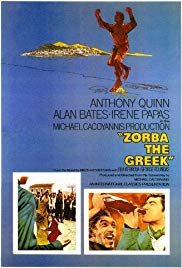
ZORBA THE GREEK
US/Greece, 1964, 140 minutes, Black and white.
Anthony Quinn, Alan Bates, Irene Papas, Lila Kedrova, George Foundas.
Directed by Michael Cacoyannis.
Zorba the Greek is based on Kazanzakis' novel, and has proved one of the most popular films of the 1960's, being continually re-released to large audiences.
The film captures a character who believes 1n the zest for living (life force seems too abstract a principle) and 1s resilient despite all kinds of sufferings, disappointment and hardships.
Anthony Quinn has done similar roles, but this one always seems the best and most authentic. He seems to have put his very being at the service of the interpretation of Zorba. His laugh, his lines, his energy, and, especially, his dancing are symbolic of our yearning for a happy life. To-day we realise our need for full personal expression of our feelings. Zorba's dance is a solution.
Alan Bates, who had not been in a poor film, (Whistle Down the Wind, A Kind of Loving, Nothing But the Best, Georgy Girl, Far From the Madding Crowd, The Fixer, Women in Love, The Go- Between, etc.) gives an excellently restrained performance as Zorba's intellectual friend. Irene Papas has worked with Cacoyannis in Elektra and The Trojan Women. Lila Kedrova won an Oscar for her moving portrayal of Madame Hortense.
Cacoyannis captures the air, the sea, the moods, the faces of Crete and invests his film with a dignity and a savagery that adds to its stature. Mikis Theodorakis' music, of course, has become famous. He was imprisoned in Greece for being a Communist and his music for the anti-Greek government, Z, was smuggled out of Greece.
Zorba the Greek will entertain most people and definitely raise questions about the joys and sufferings of life.
1. An exhilarating film as well as a sad one? Why?
2. What kind of personality did Zorba have? Zest for living was his main characteristic, a resilience after the worst of situations. Was this trait appealing?
3. How did the atmosphere, landscape, people of Crete contribute to the reality of the film, its sense of dealing with real people and basic human feelings and beliefs?
4. What contribution did the music make to the film?
5. Why did Zorba strike up a friendship with a young, bookish intellects so proper, so English and so idealistic (did he seem out of place on the wharves and with the Greek and Cretan people)? Did he and Zorba complement each other? (Or was Zorba entirely self-sufficient?) the sequence where they become friends - the cigarettes, Zorba's name, his talents and work, his laugh?
6. How was the clash of cultures shown on Crete - e.g. Madame Hortense, the old mine?
7. What role did Madame Hortense play in the film? What did she represent in life: faded romanticism and popularity and joy? How did Zorba get her to her face and behind her look? What impression did she make on Zorba's partner?
8. Sympathy with the widow - the incident with the goats, the infatuation of the young man, the lustful envy of the men? Why did they persecute her?
9. Why was the work important to everyone - they go in procession to the mine?
10. Why did Zorba get so angry with the men?
11. Why was the dance so important to Zorba, both for his joy and for his grief? What did the donee mean? Why did it involve his whole being in a kind of ecstasy? Why did his friend stop him?
12. What did Zorba's tricking the monks reveal about his way of doing things? Was the Greek Orthodox religion being mocked? Saw? Why? What of the Christmas services?
13. What did Zorba's visit to the town reveal about him?
14. Why did Zorba's friend doubt him while he was away? What was the point of his comforting Madame Hortense so strongly? Did she believe him? Was she happy?
15. Why did the young man make love to the widow? What kind of a change did it make in him? Before he left he was bookish, wearing his glasses. He now acknowledges the sensual.
16. Why did the young Cretan man kill himself for love of the widow? Who was to blame? the widow? the townspeople?
17. Why did they murder her? Was it an execution? Was it a manifestation of man's capacity for hatred and jealousy?
18. The ritual marriage of Zorba and Madame Hortense? Was it right? Were they both happy?
19. What was the effect of Madame's dying scene? Did she have a happy death? What impression did the waiting Cretan crones make (like vultures)? What did this reveal to you about human nature? Was it exaggerated?
20. The dedication ceremony of the log-carrier? sadness when the project collapsed? Zorba's reaction?
21. What was symbolised by the young man asking Zorba to teach him to dance? What had he learnt by his experience
22. Zorba stood for laughter, daring, being mad, acting by the heart, God, love, the sea and the sky. Did he have anything to teach audiences about how one should live?